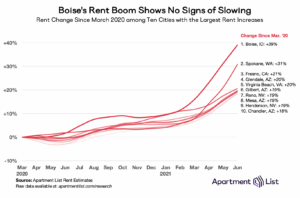A significant factor in students’ ability to excel in their courses, earn a degree, and make a positive contribution to society is dependent on their access to secure, affordable housing. This has become increasingly difficult for students across the country, but particularly at Boise State where rental costs have dramatically increased since the beginning of the pandemic. In fact, in Apartment List’s National Rent Report, Boise was #1 on the list of cities where rent prices had grown the most since the beginning of the pandemic. Boise has seen a 39% increase in rental costs over the past year. Spokane, WA came in 2nd with a 31% increase, and Fresno, CA came in 3rd with a 21% increase (1).
Mid-sized markets such as Boise, Spokane and Fresno were hot spots over the course of the pandemic when those living in large coastal cities sought out space and access to outdoor recreation as their jobs allowed remote work opportunities. While these large coastal cities saw declines in their rent prices, cities such as Boise experienced quite the opposite as the demand for rentals in the area increased even as the local economy struggled. With stagnant wages, Boise residents and college students alike have struggled to afford these increased rent prices.

Prior to the pandemic and increased rental costs, students at Boise State have been experiencing housing insecurity and homelessness at alarmingly high rates. According to the findings of the Hope Center’s #RealCollege 2021 Boise State University Report, 43% of survey respondents reported experiencing housing insecurity and 16% of survey respondents reported experiencing homelessness in the previous year (2). The U.S. 4-year institution average matches Boise State’s rate of housing insecurity, proving the prevalence of the issue on a national scale. The number of non-traditional students enrolled in college courses has increased greatly as well. These non-traditional students, such as those who are parents, first-generation, and financially independent from their families, are disproportionately impacted by housing insecurity and homelessness.
Due to the severity of housing insecurity among Boise State students pre-pandemic, we can assume that this increase in rent prices is exacerbating student’s ability to afford secure housing. Students facing housing insecurity are often struggling academically as well. A student’s academic performance is often the first aspect of their life that is impacted as it is difficult to prioritize school when you are concerned about where you are going to sleep. For example, the Hope Center’s #RealCollege 2021 Boise State University Report showed that Boise State students who reported experiencing housing insecurity earned more C’s, D’s and F’s than their counterparts who did not. Some signs that a student may be facing basic need insecurities are changes in their ability to turn assignments in on time, missing several classes, and disengagement with course material. It is important to take note of these changes and check in on students to ensure they have support and access to resources if they are struggling.
Furthermore, research finds that “housing insecurity and homelessness have a particularly strong, statistically significant relationship with college completion rates, persistence, and credit attainment”(3). College completion rates refer to the percentage of students that start a degree program at a school and are able to complete it. Similarly, persistence rates show a student’s ability to continue on to the next academic term. Long-term consequences also include the impact of student loan debt. This is particularly harmful when students are unable to earn their degree but still incur substantial debt from the time they were enrolled. There is also research supporting the association between basic needs insecurity and self-reports of poor physical health, symptoms of depression, and higher perceived stress.
Overall, students at Boise State are struggling more than ever to find secure, affordable housing that will allow them to succeed academically as well as thrive physically and emotionally. Bringing awareness to the severity and presence of this issue among students will help combat the stigma associated with seeking help. We must ensure students feel safe and supported in seeking assistance when they are struggling to find affordable, reliable housing.
Here are some resources for support if you or anyone in your life is experiencing any housing needs:
(1) https://www.apartmentlist.com/research/national-rent-data
(2) https://www.boisestate.edu/deanofstudents/wp-content/uploads/sites/155/2021/05/RC2020_InstRpt_Boise_State_University-1.pdf
(3) https://hope4college.com/wp-content/uploads/2019/04/HOPE_realcollege_National_report_digital.pdf